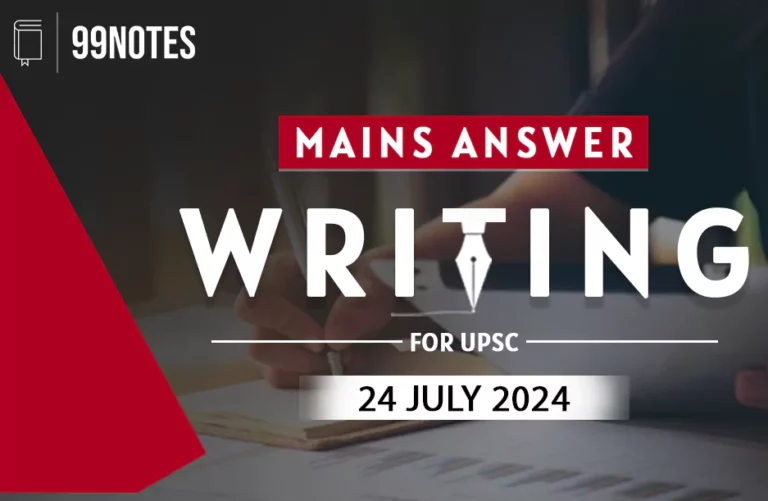27 Oct 2023 : Daily Answer Writing
Mains Answer Writing
27-october-2023
1. Highlight the key differences in the scope of Freedom of speech and expression as provided under Parliamentary privileges vis a vis Fundamental rights. Why is it necessary to maintain a balance between parliamentaryprivilege and fundamental rights?
ANSWER
- Elected Representatives enjoy the Freedom of Speech and Expression under parliamentary privileges given under Article 105 for MPs and Article 194 for MLAs of the Constitution. On the other hand, citizens enjoy Freedom of Speech and Expression as a part of their Fundamental Rights under Article 19(1)(a).
THE SCOPE OF FREEDOM OF SPEECH AND EXPRESSION AS PROVIDED UNDER PARLIAMENTARY PRIVILEGES VIS-A-VIS UNDER PART III
- Applicability: Parliamentary privileges are provided only to the representatives of citizens in the Parliament and State Assemblies whereas the Freedom of Speech and Expression as a fundamental right is enjoyed by each and every citizen of India.
- Legislature: The parliamentary privileges are enjoyed by the members of legislatures and their committees inside and related to the proceedings of the legislatures and not outside while the fundamental rights are enjoyed across the territory of India.
- Objectives: The Constitution confers this power to legislatures with the idea of protecting freedom of speech in the House and ensuring no undue influence or coercion is brought on the legislature. The fundamental Right to Speech and Expression is given to ensure liberty, freedom, and equality to citizens.
- Purpose: The main purpose of parliamentary privileges is to enable the preservation of democratic culture by protecting individual legislators against political victimization from the executive. The purpose of fundamental rights, on the other hand, is to enable a person to reach their fullest potential and restrict the state from interfering in an individual’s liberty.
- Judicial Review: Since the parliamentary privileges do not flow from Part III and are extensive, these are usually beyond the purview of judicial review while the enforcement and protection of fundamental rights is ensured by Article 32 and 226 of the Constitution.
- Reasonable Restrictions: The fundamental right to Freedom of Speech and Expression under Article 19(1) is subject to reasonable restrictions under Article 19(2). While the parliamentary privileges under Article 105 are beyond reasonable restrictions under Article 19(2).
- Contempt: Parliament under Article 105 and other privileges has the power to punish a person for a breach of privileges while no such mechanism is available for the breach of rights under Article 19(1). This can be done only by writs under Articles 32 and 226 of the Constitution.
NEED TO MAINTAIN BALANCE BETWEEN PARLIAMENTARY PRIVILEGES AND FUNDAMENTAL RIGHTS
- Parliamentary privileges state that the members of the legislatures have the right to prohibit the publication of proceedings and reports in their respective sessions. But this comes in conflict with the Fundamental Right of the freedom of speech and expression.
- The Constitution confers this power to legislatures with the idea of protecting freedom of speech in the house and ensuring no undue influence or coercion is brought on the legislature, but it is often used to insulate elected members from fair criticism.
- The prevention of maintenance of balance between parliamentary privileges and fundamental rights often leads to abuse of authority and misuse of powers. For e.g., in 2017, two editors of a tabloid were imprisoned for 1 yr and fined Rs. 10,000 for alleged contempt of the Karnataka Assembly by publishing unfair criticism of the House.
- The parliamentary privileges restrict the Right to Information available to the citizens through Article 19(1) and RTI Act, 2005. Thus, a need arises to balance such rights in order to prevent the inhibition of information to citizens which is important for the maintenance of accountability.
- The balance is needed to ensure that the social contract is upheld between the citizens and the State and privileges only remain an instrument to ensure citizen welfare and not a tool to gag genuine criticism.
- The balance between the parliamentary privileges and fundamental rights will ensure that the parliamentary privileges in no way circumvent or overshadow the fundamental rights of citizens which is a part of the Basic Structure of the Constitution.
- In the Keshav Singh case, the Supreme Court noted that the members’ privileges are subject to fundamental rights. The Supreme Court has further declared that harmonious construction will be used to settle any conflicts that may arise between the fundamental rights and the privileges.
Freedom of Speech and Expression of both the citizens and the individual legislators should be used as an instrument to strengthen the democratic culture in the country through proper debate, discussion, and deliberation over issues. The legislators must realize that no rights are devoid of duties and ensure that the exercise of every right must contribute to the nation-building process.
Upload Answer here
2. Discuss the impact of digitalization and simplification of tax administration on tax compliance and revenue collection in India.
Answer Will Upload At 11 A.M Tomorrow
Upload Answer here
3. Discuss the importance of dialogue and understanding opposing viewpoints in conflict resolution, with reference to the ongoing crisis in Manipur.
Answer Will Upload At 11 A.M Tomorrow
Upload Answer here
4. Examine the implications of utilizing civil servants for political tasks and its impact on the bureaucracy’s impartiality and ethical standards. Suggest measures to address these challenges for upholding the integrity of the civil services.
Answer Will Upload At 11 A.M Tomorrow
Upload Answer here
For Enquiry

28 Oct 2023 : Indian Express

28 Oct 2023 : PIB

28 October 2023 : Daily Current Affair

28 October 2023 : The Hindu Editorial Notes PDF

27 Oct 2023 : Daily Quiz

27 Oct 2023 : Daily Answer Writing

27 Oct 2023 : Indian Express

27 Oct 2023 : PIB

27 October 2023 : Daily Current Affair

27 October 2023 : The Hindu Editorial Notes PDF



